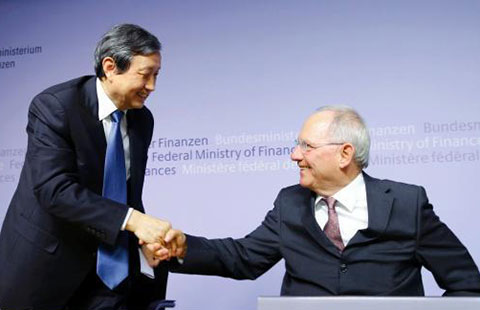Securities sector may open wider to foreign partners
(Agencies) Updated: 2015-03-24 07:43China is considering sweeping changes to its securities industry that would allow foreign banks to control their local joint ventures and broaden their offerings, according to people with knowledge of the matter.
Overseas firms could be allowed to own majority stakes in local ventures as soon as this year, and they may ultimately be able to take full control, said the people. Regulators also plan to give foreign-owned joint ventures permission to expand into areas beyond stock and bond underwriting, sources said, asking not to be named.
Loosening restrictions that currently limit overseas banks to 49 percent ownership will let them more effectively compete with incumbents such as CITIC Securities Co in Asia's largest equities market.
Greater foreign participation could also help China develop its securities industry, more than a decade after Goldman Sachs Group Inc set up a joint venture in Beijing.
"It's a very significant move and will provide a great incentive for foreign banks to deploy more resources in China," said Edmond Law, a Hong Kong-based analyst at UOB-Kay Hian Holdings Ltd.
The China Securities Regulatory Commission did not respond to a request for comment.
China stepped up opening its capital markets after it was admitted to the World Trade Organization in December 2001. The government also encouraged local brokerages to find overseas partners to help strengthen an industry riddled with corruption scandals, mismanagement and losses.
Since then, the country's securities firms have surged in value as the nation's economic boom pushed stock markets higher and trading volumes soared in Shanghai and Shenzhen.
Foreign-backed joint ventures, restricted primarily to handling share sales and bond underwriting and trading, did not benefit to the same extent.
China's securities regulator said earlier this month that it was studying a proposal to let banks apply for brokerage licenses, signaling a looming shakeup for local securities firms, which numbered 120 in 2014 and have been protected for years by government restrictions on new entrants.
"The major way to expedite its capital market reform is to allow more foreign capital into the market," said Law. "It's going to take a while before overseas players can really crack into the market, so the threat to local firms isn't imminent."
China's securities regulator may take into account how long an overseas firm has operated in the country in deciding how much the scope of its business can be broadened, sources say.
That would benefit Goldman Sachs Group Inc and UBS Group AG, which have two of the longest-running securities joint ventures.
In 2004, Goldman Sachs was granted approval to create a joint venture with Beijing Gao Hua Securities Co, set up by Chinese banker Fang Fenglei.
Since the temporary ban on foreign-owned joint ventures was lifted at the end of 2007, JPMorgan Chase & Co, Morgan Stanley, Credit Suisse Group AG, Deutsche Bank AG and Citigroup Inc have entered the market.
In May 2012, China agreed to let foreign banks raise their stakes in these securities firms to as much as 49 percent from the previous 33 percent cap.
- Israel requests to join Asian Infrastructure Investment Bank
- Chinese stocks rebound on April 1
- China, the West in Africa: more room for cooperation than competition
- Nanjing cuts taxi franchise fees
- Air China increases flights to Milan, Paris
- JD.com raises delivery charges
- Veteran corporate strategist upbeat about China economy
- L'Oreal China sales revenue up 7.7% in 2014

















